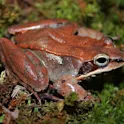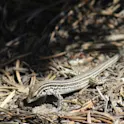Lizards at US Army installation are stress eating during flyovers
By Mischa Dijkstra, Frontiers science writer Colorado checkered whiptail, Aspidoscelis neotesselata. Image credit: Carina Kusaka Scientists studied the response of an uncommon asexual lizard, the Colorado checkered whiptail, to anthropogenic noise at the military installation Fort Carson. They compared the lizard’s behavior between dates with and without flyovers by military aircraft. On flyover dates, the lizards showed a physiological stress response and spent more time eating and less time moving. These results suggest that the lizards deal with noise pollution by eating more to maintain the energy levels. Lizards may be small, with only a single hearing bonelet compared to our three, and without earflaps, but their hearing is typically good. Most lizards can hear frequencies between 100 and 5,000 Hz (although they are most sensitive between 400 and 1,500 Hz), compared to between 20 and 20,000 Hz in humans. So how do lizards react to noise pollution? Here, scientists studied the impact of noise from low-flying military aircraft on the behavior and well-being of an uncommon lizard, the Colorado checkered whiptail (Aspidoscelis neotesselatus). This was done at the Fort Carson US military Installation near Colorado Springs, where Apache, Chinook, and Blackhawk helicopters regularly fly over, and occasionally transport aircraft […]



